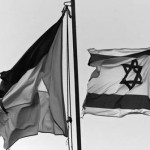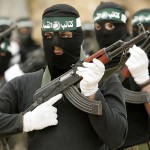Palestine-Israel Analysis: Ramallah's "One Month Trial" and Netanyahu's "Security Card"
 Monday, August 23, 2010 at 16:58
Monday, August 23, 2010 at 16:58  After half the members of the Executive Committee of the Palestine Liberation Organization failed to attend the discussion over direct talks with Israel, the Palestinian Ma'an News Agency reported that Hamas cancelled Saturday's reconciliation meeting with Fatah.
After half the members of the Executive Committee of the Palestine Liberation Organization failed to attend the discussion over direct talks with Israel, the Palestinian Ma'an News Agency reported that Hamas cancelled Saturday's reconciliation meeting with Fatah.According to the London-based Arab language daily Al-Quds Al-Arabi, the Palestinian Authority leader Mahmoud Abbas has re-labeled the talks as a two-stage process: a one-month trial period to see if Israel's Netanyahu Government will extend the freeze on West Bank settlements and then direct talks focusing on core issues.
Israel-Palestine: Forget the Hype, Talks Are Going Nowhere (Walt)
For that second stage of the talks, Abbas suggested that the Quartet --- in which Russia, European Union, and United Nations sit with the US --- can press Washington to get Israel to reveal its hand, behind closed doors, on the borders of a future Palestinian state. In a letter, Abbas urged the Quartet members to abide by resolutions of the UN pertaining to the Israeli-Arab conflict, the principles of the 1991 Madrid Peace Conference, the 2002 road map and the 2002-2007 Arab Peace Initiative.
Azzam al-Ahmed, a senior Fatah official who also serves as an adviser to Abbas, expressed dismay over Washington’s failure to invite representatives of all the Quartet members to the launch of direct talks in Washington early next month.
On the Israeli front, Prime Minister Netanyahu is preparing to use his best card, "security issues", as soon as the talks commence. Over the weekend, Netanyahu said he plans to focus on security arrangements before addressing final borders. (That means "drawing final borders across security arrangements". If Israeli forces are deployed in the Jordan Valley and most of the 500.000 Israeli settlers are kept as a buffer force for the Israeli state from missiles, then the lines have more or less been drawn.)
Netanyahu increased the pressure by depicting a "real partner on the Palestinian side, sincere and serious in negotiations, negotiations which will require both sides to take necessary measures, not only the Israeli side but also the Palestinian side”. Then it would be possible to “shortly reach a historic peace agreement between the two peoples.”
In response to Ramallah's "one-month trial" for the extension of a settlement freeze, Netanyahu will use his "security" card in order to get the maximum concessions at the beginning of negotiations. That is a wise strategy: if the concessions are not made, then West Jerusalem can blame Ramallah for not living up to its agreement to negotiate. However, that in turn also points to the difficulty of getting Israel to move beyond the initial phase of talks.
Who might be responsible for that position? What about a country whose administration once supported Palestinians pre-conditions --- including the settlement freeze and ending the occupation in East Jerusalem --- yet, with urgent phone calls to Ramallah, has insisted on no pre-conditions and definitely no reference to Israel's weapons programmes, including its nuclear capability? Any guess who that might be?

